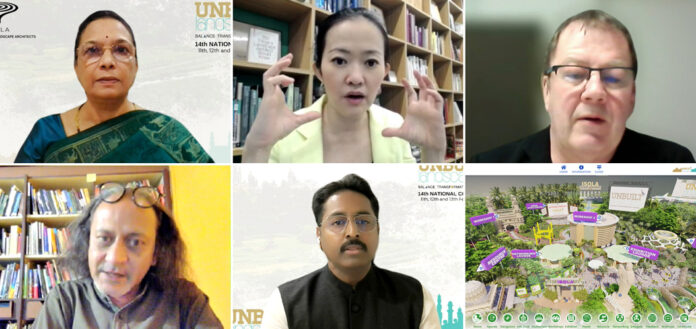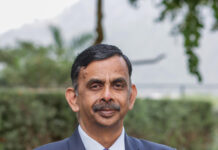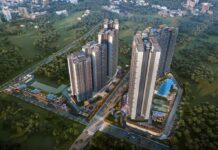Hyderabad, February 12, 2022: The three-day virtual conference of Landscape Architects, “14th National Conference of ISOLA” with the unique theme “Unbuilt Landscapes” opened on Friday virtually and will continue till 13th February. It is hosted by the Hyderabad Chapter of the Indian Society of Landscape Architects (ISOLA). ISOLA is a two-decade-old national professional body of Landscape Architects.
The theme “Unbuilt Landscapes”, intends to focus on the relation between the built & unbuilt environments. The Unbuilt landscapes can be understood through the three lenses: Balance, Transformation & Renewal.
The mascot for the Conference is the Indian Roller bird or Indian Blue Jay, a carefully chosen one that emphasizes the fragile character of natural and human inter-relationships and interference. This bird is commonly known in Telangana State as Palapitta or Neelkanth and is a protected species.
Delivering her keynote address, Ms Kotchakorn Voraakhom, the Thai landscape architect who made a mark at COP-26 and recipient of the United Nations Global Climate Action Award at the recently concluded the 26th Conference of Parties (CoP 26) at Glasgow explained how she was determined to save Bangkok from drowning. “The health of the city is directly related to the health of the people,” Kotchakorn Voraakhom said, explaining how holidaymaker’s haven Thailand was once considered a Happy City. She recalled how as a child she used to enjoy floods in the city of Bangkok in her childhood. So much so that she’d be able to sail a little makeshift boat down them. But, was once a fun activity that turned into a nightmare for many.
The flooding of the city reached such a level that in the year 2011 was the worst flood in its history. And now it is estimated that the city will be underwater by 2030. The New York Times state the raising seal will erase more cities by 2050. But, many governments which are trying to find engineering-based solutions are not going to yield any positive results. And she added that Urban Planning is the key factor. Like my city, many cities are being run without any proper plan.
She has showcased many of her projects including Chulalongkorn University Centenary Park – green infrastructure for the city of Bangkok.
It is the first critical piece of green infrastructure for the city of Bangkok, designed to mitigate detrimental ecological issues and add much-needed outdoor public space to the grey city. This Park is designed to face future uncertainties of climate change as Bangkok is a climate-vulnerable city. It has little green space, and this park, which contains the largest green roof in Thailand, is an invaluable addition to the ecological landscape.
Kotchakorn Voraakhom and her team built an innovative park in Bangkok that controls floods. The rainwater here flows into special tanks underneath the park.
And it can be used to water the entire park for 20 days. The tanks can hold 3.8 million litres of rainwater. It is almost the same as filling an American football field with water 1 meter deep.
Cities are for the living. Parks are one of the answers to building happier cities, she said. She is confident of turning Bangkok from a grey city into a green city.
Mr Mohan S. Rao, Principal Design, Integrated Design (INDE) India spoke about nurturing an unbuilt landscape, which he said is meant to convey the idea of mindful interventions reinforcing rather than replacing or transforming nature. He spoke about the balance aspect of the theme.
Mr.Dirk van Peijpe, Founder and Director, DE URBANISTEN, Netherlands. This Urban designer who has vast experience in urban planning and the design of urban public spaces shared his experiences. Dirk van Peijpe was responsible for the Rotterdam Climate Adaptation Strategy, initiated the ZOHO-Climate proof District in R’dam, participated in Rebuild By Design in NY (US) and designed the first Cloudburst_street for CPH. He spoke about how we can make our cities climate-sensitive? Quoting Charles Darwin he said, “It is not the strongest of the species that survive, nor the most intelligent that survives. It is the one that is most adaptable to change”.
Speaking further he said let us make our cities more liveable and attractive.
Reminded what Jan Gehl, a Danish architect and urban design consultant said “A good city is like a good party, people stay longer than necessary because they are enjoying themselves”. Cities are for people to live and enjoy. He shared his experience with The Water Plan of the City of Antwerp.
Welcoming the gathering, Dr Sridevi Rao, National Honorary President of ISOLA and a Hyderabad Landscape Architect, a visiting faculty said ‘India has three quantifiable nationally determined contributions (NDCs) as part of the Paris Agreement that includes lowering emissions, increasing power generation away from fossil fuels, and creates a carbon sink of 2.5 to 3 billion tons. Today, India is the only country in the G20, which is moving fast towards achieving its climate goals. India has set a target of 450 GW of renewable energy by the end of this decade that is 2030.’
As a Landscape Architect, the reference from a Government of India press release offers great opportunities for implementing the International Federation of Landscape Architects or the IFLA Climate Action Commitment. The 10 Chapters of ISOLA are keen to showcase solutions and have the expertise to do so. However, Landscape Architecture is not recognized as a profession by the Government of India. And yet, ISOLA encourages rewarding such aspects among others through its Awards program in various categories, Also, Dr Sridevi Rao added in terms of funding, India’s 2021 stimulus package has two-thirds of the resources targeted towards green recovery. As a “bridge” between human activity and nature, the savings through effective design and distribution of saved financial resources to other critical areas is vital for the Government of India to achieve its National Goals. Landscape Architects through ISOLA are best equipped as a profession to do this.
750 plus Landscape Architects, including members of ISOLA, landscape architects, architects, urban designers, ecologists, planners, government agencies & allied professionals. etc. are participating in the first virtual conference informed Mr Naveen Panuganti, Conference Convener, the Landscape Architect behind Statue of Equality while giving his opening remarks.
Speaking further he added, just as we adapted and have been adapting to a multitude of changes in our lives to settle into the new normal, they also made a very significant contribution by making us re-align the way we perceive open spaces. These temporary changes helped us re-imagine our cities as a place that feels and smells better, sounds more peaceful and permits better sleep. The derivation of these experiences allowed us to design the framework for this year’s conference theme “Unbuilt landscapes”.
























